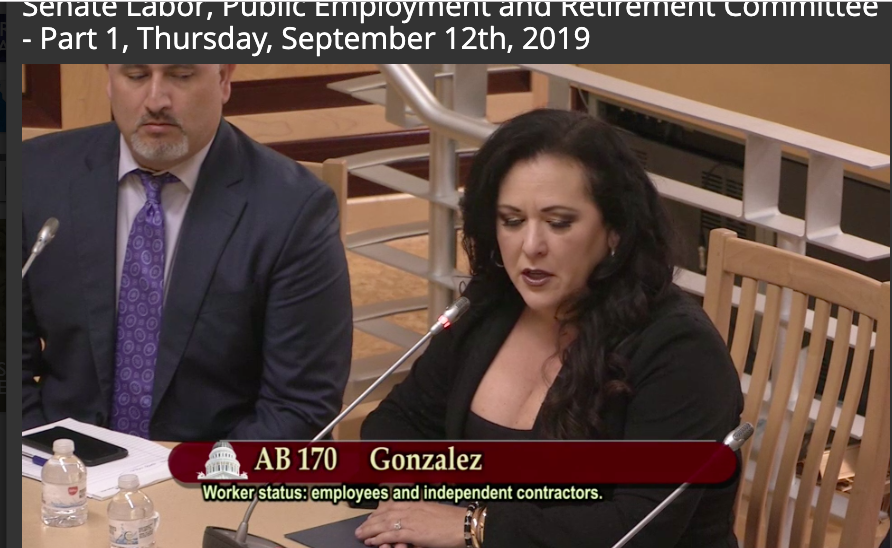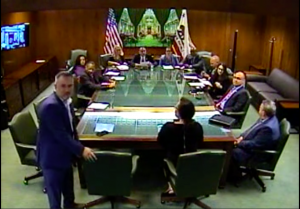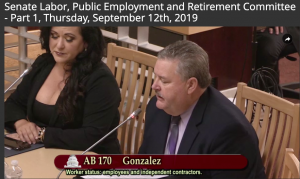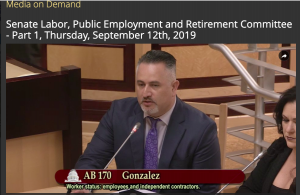
Assemblywoman Lorena Gonzalez, Senate Labor Public Emp, Retirement Committee. (screen capture)
How Assemblywoman Lorena Gonzalez was Forced to Author AB 170 and Voted NO on Her Own Bill
‘Negotiations usually have two sides, but I had no other choice’
By Katy Grimes, September 16, 2019 4:35 pm
The end of the legislative session each year always brings drama, sub-rosa backroom deals under the cover of darkness, accusations of double-dealing, and surprises. This year, the end of session also brought insults, bullying, tears, coercion, and the usual backroom deals.
Specifically, Assembly Bill 5 by Assemblywoman Lorena Gonzalez (D-San Diego) and Assembly Bill 170, a gut-and-amend bill Gonzalez says was forced on her by the Senate if she wanted AB 5 to pass, are the culprits.

AB 5 codifies the decision of the California Supreme Court in Dynamex Operations West, Inc. v. Superior Court of Los Angeles (2018) that presumes a worker is an employee unless a hiring entity satisfies a three-factor test, and exempts from the test certain professions and business to business relationships, bill analysis says.
“Assembly Bill 5 by Assemblywoman Lorena Gonzalez (D-San Diego) could destroy California’s Gig economy if passed and signed into law,” California Globe reported last week. “The Gig economy includes ride-share businesses like Uber and Lyft, and food delivery services Postmates and DoorDash – and apparently many more independent business groups.”
Many industries begged for exemptions from AB 5 however, some were granted. By the time the bill was voted on, there were already more than 30 industries/professions exempted in the carve-out of AB 5, making crystal clear that this bill was aimed at the ride-share industry. “But it will serve to take out independent truck drivers, tow-truck drivers, and a number of driving-related jobs, if allowed to pass,” California Globe reported.
From AB 5: These exempt occupations would include, among others, licensed insurance agents, certain licensed health care professionals, registered securities broker-dealers or investment advisers, direct sales salespersons, real estate licensees, commercial fishermen, workers providing licensed barber or cosmetology services, and others performing work under a contract for professional services, with another business entity, or pursuant to a subcontract in the construction industry.
At issue was the last-minute exemption from AB 5 by the newspaper industry. Editorial boards across California wrote scathing reviews of AB 5, largely agreeing that Uber, Lyft and Doordash and the Gig economy independent drivers should be regulated, yet focused on how the bill could do permanent damage to the newspaper industry with carriers and delivery drivers falling under the new classification.
“At its most basic level, AB 5 raises some important and worthwhile questions about the value of work and the protection of workers’ rights in a rapidly changing economy,” the Sacramento Bee editorial Board wrote. “Its main target appears to be relatively new multibillion-dollar “gig economy” companies like Uber and Lyft, which have disrupted full-time taxi jobs in exchange for a gig model that some say cuts workers out of the profits.”
“The bill, as currently written, could force many California newspapers out of business.”
Thus, the amendment exempting the newspaper industry was put in a gut-and-amended bill, AB 170, also by Gonzalez, which said: “This bill would, until January 1, 2021, also exempt a newspaper distributor working under contract with a newspaper publisher and a newspaper carrier working under contract, either with a newspaper publisher or newspaper distributor, from the Dynamex provisions proposed to be added by AB 5 described above.”
“This is my bill. I’m adamantly opposed to it,” Gonzalez said. “I think it is a disgrace that the Senate shoved it down my throat. I was forced to gut-and-amend a bill as a condition of getting AB 5 off the floor of the Senate.”

Gonzalez, in testimony before the Assembly Labor and Employment Committee late Friday, and the Senate Labor, Public Employment, and Retirement Committee Thursday, said the Dynamex decision was “aimed at this type of abuse” with the newspaper industry and it’s decades of abuse of lower-level employees by improperly classifying them as “independent contractors.”
Her voice was shaky and she dabbed at her eyes from time to time, waning between anger and sadness.
“Currently there are 562 claims under Dynamex against large newspaper companies by carriers, jobs largely held by women of color who have been historically misclassified, and will continue to be misclassified for an additional year,” Gonzalez said.
Gonzalez said current claims against newspaper producers by independent carriers may find their cases also exempted this next year, because of the special exemption from AB 5. “Justice delayed will probably be justice denied,” she said.
Jim Ewert, General Counsel with the California News Publishers Association was at both hearings on behalf of Newspaper producers, and assured lawmakers that the newspaper industry would make the required changes by the end of the year.

Cesar Diaz, Legislative Director with the State Building and Construction Trades Council, said they were part of the negotiations, and support AB 170.
Gonzalez, who also comes from the labor industry, noted “negotiations usually have two sides, but I had no other choice but to bring this forward as a condition of AB 5’s passage.”
The Senate Labor Committee seemed focused on the importance of continuing to have a free press as justification for passage of AB 170. “I want to preserve the integrity of the free press; it is critical to our Democracy,” said Sen. Hannah Beth Jackson (D-Santa Barbara).
Assemblywoman Luz Rivas (D-Arleta Los Angeles) said she was concerned because “there are many other industries that don’t get an extra year to think about this.”
AB 170 was passed by the Assembly Labor Committee 4-2 with two abstentions, and passed the Senate Labor Committee 5-0.
The IRS definition of an independent contractor is very clear: “The general rule is that an individual is an independent contractor if the payer has the right to control or direct only the result of the work and not what will be done and how it will be done.”







There are four employment classifications, not two, and this law has the opposite impact: it expands the definition of statutory nonemployees but reclassifies many contractors as common law employees when they should be statutory employees.
There should not be any such thing as “employees.” There should only be persons who contract to work for others. The idea of Employers and Employees belongs back in the Dark Ages when Lords and Barons ruled over there serfs with an iron fist. People ought to be free now. Why are we treated worse than Russian peasants, for crying out loud?